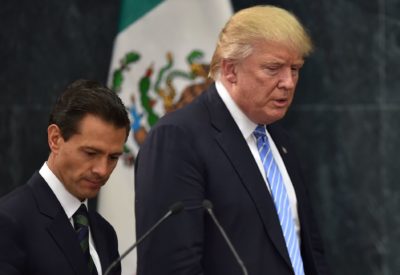Could Mexican Lives Be Saved by Trump’s Presidency if the New Mexico City Constitution Will Not Protect Them?

As usual, cultural Marxists—and all those who aim at destroying the beauty, and at obscuring the true value and meaning of human dignity, of life, and of the family—are taking advantage of international turmoil, and distraction, to push for and advance their destructive agendas.
In Mexico, national and international observers are focusing on both the internal problems of the country, and on the future of US-Mexico relations. Thousands of articles are being published which address Trump’s potentially dangerous new policies on immigration and on international trade. In the midst of this, the capital is about to approve a constitution that fully trashes life – from conception to death.
The new proposed Constitution of Mexico City (CDMX), to be approved on January 31st, is also expected to violate the rights of children, and of the family, as they are recognized and protected by international law. In addition, it may be the first world’s Constitution to recognize a right to die.
What the draft now includes has already been described as “rubbish” (bodrio) by the First Archdiocese of Mexico. Indeed, with reference to how the text handles human dignity and fundamental rights, one may argue that it is the worst world’s constitution ever proposed after WWII.
Notwithstanding the joined and intense efforts of PRI (Institutional Revolutionary Party), PAN (National Action Party), PVEM (Ecologist Green Party) and PES (Social Encounter Party) coalition, the constituents refused to include protection of the right to life in the text. They feared that, by including a wording that protected life “from the moment of conception”, as was suggested six times during the discussion, they would have violated “abortion rights” of Mexican women. While abortion is not an international right, life is. Moreover, abortion is not a federal right in Mexico.
The immense work, and the thousands of voices of the Civil Society represented by the Frente Nacional Por La Familia, were completely disregarded, too. The right to marriage is now phrased as a right to “egalitarian unions”.
But there is more. Last week, the text of Article 11 was approved, and it recognizes the right to a “dignified death” (muerte digna). The proposal was introduced by Jesús Ortega, PRD (Party of the Democratic Revolution). It mentions that “everyone has a right to self-determination and to a free development of its personality. This fundamental human right must guarantee that each person can fully exercises its faculties to live a life with dignity. A dignified life implies the right to a dignified death.”
One may wonder if this is what the drafters of the Universal Declaration of Human Rights had in mind. Undoubtedly, Adolph Hitler thought that gas chambers were a very dignified way to die – at least, for some. A constitutional right to a dignified death may soon imply that medical treatments for incurable diseases will not be covered by insurances any longer (why should an insurance pay for something that is not “dignified?”).
The risks involved in the approval of this Constitution are not limited to Mexico City and to its citizens’ rights. The fact that the capital was not an independent state was no obstacle to its leadership in the recognition of same-sex marriage, nor to its pioneering role in the legalization of abortion throughout the country, but now things may get worse.
As the constitutionalist Diego Valadés explained, “Consistent with the Federal Constitution, Article 1 recognizes the progressive and universal nature of fundamental rights. This means that the rights that will be granted and enjoyed in one part of the country, will be considered as reference for the whole state.”
The hyper-liberal CDMX could therefore bring about the extension of euthanasia to the whole territory of Mexico.
While Trump’s opponents feared that his election would mean worsening the positions, and the rights, of Mexicans, the dangers come from within – from the capital itself.
In addition to the above, and to the constitutional recognition of homosexual marriages, and homosexual adoptions, the new CDMX Constitution, while violating the most vulnerable citizens (children, people with disabilities, elderly, and unborn), protects those of animals.
The soon-to-be-approved text recognizes rights to “non-human animals”, based on their “inherent dignity”. As proponents said: “animals are inhabitants of the city and the most vulnerable part of society.”
Instead of fearing Trump’s presidency, Mexicans should now hope that his pro-life stance will influence this most disastrous process, and expand to Mexico.
View online at: https://c-fam.org/turtle_bay/mexican-lives-saved-trumps-presidency-new-mexico-city-constitution-will-not-protect/
© 2025 C-Fam (Center for Family & Human Rights).
Permission granted for unlimited use. Credit required.
www.c-fam.org

